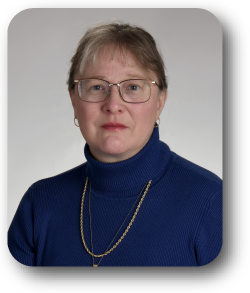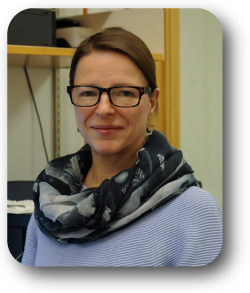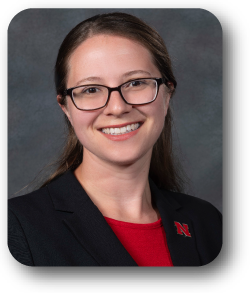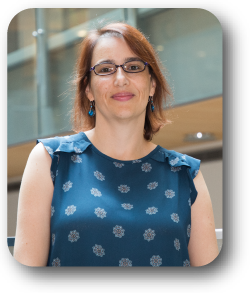
Dr. Liskin Swint-Kruse
Department ChairDepartment of Biochemistry and Molecular Biology
University of Kansas Medical Center
Dr. Liskin Swint-Kruse earned a BS in Chemistry from Baylor University and a PhD in Biochemistry from the University of Iowa, where she worked with Dr. Andrew Robertson to assess the relationship between overall protein stability and local structural fluctuations. She then performed post-doctoral work in the W. M. Keck Center for Computational Biology with Drs. Kathleen Matthews (Rice University) and Monte Pettitt (University of Houston). She then moved to the University of Kansas Medical Center, where she is now Professor and Chair in the Department of Biochemistry and Molecular Biology and previously served as the Associate Director of the Interdisciplinary Graduate Program in Biomedical Sciences. The main research interest of the Swint-Kruse laboratory relates to the evolution of protein functional variation, which has implications for advancing personalized medicine and understanding pathogen evolution. Other interests include engineering synthetic transcription repressors for biotechnology and the regulation of central metabolism in γ-proteobacteria.
Learn more about the Dr. Swint-Kruse’s research at the lab’s website.

Dr. Olga Boudker
ProfessorDepartment of Physiology and Biophysics
Cornell University
Howard Hughes Medical Institute Investigator
National Academy of Sciences Member
Olga Boudker completed her undergraduate studies at Novosibirsk State University in the Russian Federation. She then received her M.Sc. and Ph.D. from the Weizmann Institute in Israel and the Johns Hopkins University in Baltimore. During her Ph.D., Boudker focused on the thermodynamics of protein folding and conformational changes, working under the guidance of Ernesto Freire. After a brief postdoctoral period at MIT, she joined the lab of Eric Gouaux at Columbia University, where she started working on the structure and mechanism of glutamate transporters. In 2005, Boudker launched an independent research program at Weill Cornell Medicine, focusing on the structure, mechanism, evolution, and modulation of membrane ion-driven transporters. She rose through the ranks and is now a Professor and Acting Chair of the Department of Physiology and Biophysics. Among other awards, she received the Michael and Kate Barany Young Investigator from the Biophysical Society, the Cole Award from the Membrane Biophysics Subgroup, and the Javitz Neuroscience Award from the National Institute of Neurological Disorders and Stroke. She became an HHMI Investigator in 2015 and was elected to the National Academy of Sciences in 2022.
Learn more about the Dr. Boudker’s research at the lab’s website.

Dr. Catherine Eichhorn
Assistant ProfessorDepartment of Chemistry
University of Nebraska at Lincoln
Dr. Eichhorn is an Assistant Professor of Chemistry at the University of Nebraska – Lincoln. She received her BA in Chemistry at Bryn Mawr College and Ph.D. in Chemical Biology at the University of Michigan Ann Arbor. Her graduate research with Hashim Al-Hashimi focused on the conformational dynamics and biophysical properties of RNA to understand riboswitch-ligand recognition using solution NMR spectroscopy. Her postdoctoral research with Juli Feigon focused on structure and assembly of the core 7SK ribonucleoprotein complex using solution NMR spectroscopy, X-ray crystallography, and biochemical approaches. In her independent career, her research group works to understand the folding and function of regulatory RNAs and RNPs using integrated structural biology, biophysical, and chemical biology tools.
Learn more about the Dr. Eichhorn’s research at the lab’s website.

Dr. Marcia Levitus
ProfessorSchool of Molecular Sciences and the Biodesign Institute
Arizona State University
Dr. Marcia Levitus is a Professor of Chemistry and Biochemistry at Arizona State University. Her research primarily focuses on single-molecule biophysics and molecular photophysics. Her current projects aim to elucidate the thermodynamics and conformational dynamics of protein-protein and protein-nucleic acid interactions, contributing valuable insights to the field of biophysical chemistry.
She earned her Ph.D. in Chemistry from the University of Buenos Aires, Argentina, in 1998, where she specialized in photochemistry. Following her doctoral studies, she conducted postdoctoral research at UCLA from 1998 to 2000 and at UC Berkeley from 2000 to 2004, focusing on organic photochemistry and single-molecule fluorescence.
Throughout her career, Dr. Levitus has been recognized with several awards, including the NSF CAREER Award in 2007, the Young Investigator Award from the Interamerican Photochemical Society in 2010, and a teaching award from the Student Affiliates of the American Chemical Society at Arizona State University in 2019. She currently serves as editor-in-chief of the leading journal in fluorescence research, Methods and Applications in Fluorescence.
Learn more about the Dr. Levitus’s research at the lab’s website.

Dr. Tobin Sosnick
Department ChairDepartment of Biochemistry and Molecular Biology
University of Chicago
Dr. Sosnick has been the chair of the Department of Biochemistry and Molecular Biology for the past decade. He joined the University of Chicago in 1996. His research is based on the premise that rigorous and innovative studies of basic processes have broad implications in many areas of biological research. Dr. Sosnick received his Ph.D. in low temperature physics from Harvard University in 1989. He transitioned to biophysics during his post-doctoral training with J Trewhella (Los Alamos) and SW Englander (UPENN) where he applied small-angle X-ray scattering, hydrogen exchange, and NMR to study protein folding and dynamics. Current research interests include experimental and computational studies of the function, folding, and dynamics of soluble and membrane proteins including properties of disordered proteins; phase separation, folding of ion channels and mechanobiology, and LOV2-based optogenetics. Prof. Sosnick is co-director of the Graduate Program in Biophysical Sciences, a unique dual-mentored graduate training program he developed.
Learn more about the Dr. Sosnick’s research at the lab’s website.